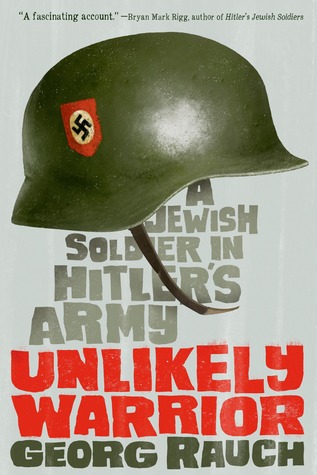 Rauch, Georg. Unlikely Warrior: A Jewish Soldier in Hitler's Army
Rauch, Georg. Unlikely Warrior: A Jewish Soldier in Hitler's ArmyFebruary 24th 2015 by Farrar, Straus and Giroux (BYR)
E ARC from Edelweiss Above the Treeline
This memoir was penned by Mr. Rauch starting in the 1980s, and self-published in 2006, shortly before he passed away. It was written in German and translated by his wife, Phyllis Rauch. Letters that Rauch had sent home to his mother from the Russian front were the instigation for this tremendously interesting look at life at this time.
Georg grew up in Vienna, the son of a Jewish baroness and a gentile miltary man. Because of his father's war service, the family was left alone for a while, and his mother even sheltered Jews for a time. Georg did not manage to escape the draft, but luckily had skills as a telegraphist. He was going to be sent to officer's training, but when he told his commanding officer that he was Jewish, he was instead assigned to the infantry and sent to the front. He was still able to work as a communications officer, so instead of being involved directly in the fighting, he was often trying to reestablish communications, or telegraphing information back and forth. His letters tell intimate details of lice, worn out socks, the extreme cold of Russian winters, and the food situation. After spending time in Russia and being pushed back to Romania, he is taken prisoner by the Russians. Through luck, he manages to make some connections and agrees to spy on and report Nazis, but becomes tremendously ill. He is given special care because of his agreement, and is aided by a fellow Austrian... who turns out to most likely be a party member. Before Rauch has to turn him in, however, the Russians set them free, and he makes his way back to Vienna, eventually reconnecting with his family.
Strengths: This was a fascinating look at a little covered (in the US) facet of WWII-- what it was like to be in the Wehrmacht. It shows vividly that so much of life is luck-- things could have gone wrong for Rauch at so many points in the procedures, and yet he survives. I had a dear friend who was from Polish Silesia who also served against his will, and who was stationed in very much the same areas, so the story rings very true. The inclusion of the letters shows an unusually optimistic outlook, tempered by the analysis of an older and wiser viewpoint.
Weaknesses: I had to stop and refresh my memory on some of the fine points of who-was-where during the war; younger readers might benefit from more historical notes, but this would certainly dilute the narrative.
What I really think: Highly recommended. Just sad that Rauch is no longer with us to see this be widely read.

























Thank you for your post. I am co-leading a summer middle school book club specifically meant to understand how to effectively read nonfiction. The kids chose the topic and decided on the book to read. I think this book will be an exciting way to delve into many of the texts we will be sharing with one another.
ReplyDelete